
"Every Breath You Take" is a song by British rock band the Police from their album Synchronicity (1983). Written by Sting, the single was the biggest US and Canadian hit of 1983, topping the Billboard Hot 100 singles chart for eight weeks, and the Canadian RPM chart for four weeks. Their fifth UK No. 1, it topped the UK Singles Chart for four weeks. The song also reached the top 10 in numerous other countries.
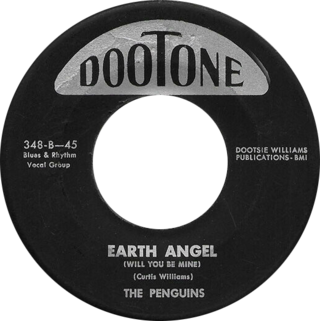
"Earth Angel", occasionally referred to as "Earth Angel (Will You Be Mine)", is a song by American doo-wop group the Penguins. Produced by Dootsie Williams, it was released as their debut single in October 1954 on Dootone Records. The Penguins had formed the year prior and recorded the song as a demo in a garage in South Central Los Angeles. The song's origins lie in multiple different sources, among them songs by Jesse Belvin, Patti Page, and the Hollywood Flames. Its authorship was the subject of a bitter legal dispute with Williams in the years following its release.
"Canadian Sunset" is a popular song with music by jazz pianist Eddie Heywood and lyrics by Norman Gimbel. An instrumental version by Heywood and Hugo Winterhalter reached No. 2 on the Billboard Hot 100 chart and No. 7 on the R&B chart in 1956. A version sung by Andy Williams was also popular that year, reaching No. 7 on the Billboard chart. The Sounds Orchestral, conducted by Johnny Pearson, hit the Easy Listening chart reaching No. 14 and the Billboard Hot 100 in 1965 reaching No. 76.

"Denise" is a song written by Neil Levenson that was inspired by his childhood friend, Denise Lefrak. In 1963, it became a popular top ten hit on the Billboard Hot 100 chart, when recorded by the American doo-wop group Randy & the Rainbows. A cover version by the American new wave group Blondie, re-titled "Denis", hit number 2 in the UK Singles Chart in 1978. Dutch actress and singer Georgina Verbaan covered "Denis" in 2002 and reached number 30 on the Dutch Singles Chart.
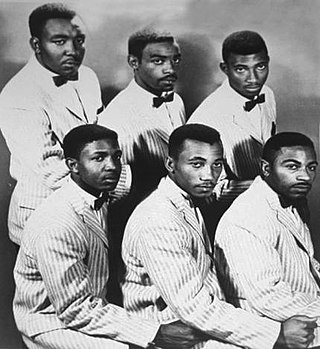
Maurice Williams and the Zodiacs were an American doo-wop/R&B vocal group in the late 1950s and early 1960s. Originally the (Royal) Charms, the band changed its name to the Gladiolas in 1957 and the Excellos in 1958, before finally settling on the Zodiacs in 1959.

Betty Jean Everett was an American soul singer and pianist, best known for her biggest hit single, the million-selling "Shoop Shoop Song ", and her duet "Let It Be Me" with Jerry Butler.
"Heart and Soul" is a popular song composed by Hoagy Carmichael with lyrics by Frank Loesser. It charted with different artists between 1938 and 1961. A simplified version is a popular piano duet.

"Doo Wop (That Thing)" is a song by American recording artist Lauryn Hill for her debut solo studio album The Miseducation of Lauryn Hill (1998). It was written and produced by Hill. The song was released as her solo debut and lead single from The Miseducation of Lauryn Hill on August 10, 1998, by Ruffhouse Records and Columbia Records. No commercial release was originally intended for the single in the US, but limited-quantity physical formats were issued two months later, on October 27.
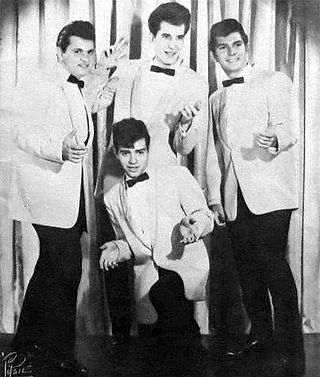
The Earls, often credited as Larry Chance and the Earls, is an American popular music group formed in The Bronx, New York. In a career spanning over 60 years they formed in the early 1960s, though their roots can be traced back to 1957 in a group called the High-Hatters. They were one of the most accomplished white doo-wop groups of the early 1960s, especially in their home state of New York. In 1962, they became known for their signature hit single "Remember Then", which still remains a staple of doo-wop music. Later in their career they experienced moderate success with songs such as "Life Is But a Dream", "Never" and "I Believe". In the 1970s and 1980s, an oldies revival scene began and the Earls re-experienced success and became one of the most requested popular groups in the doo-wop genre. The group still continues to perform.
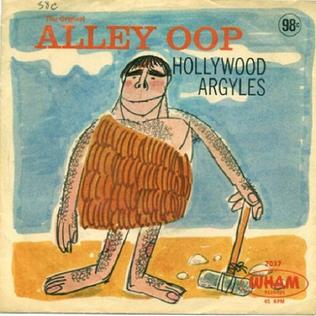
"Alley Oop" is a song written and composed by Dallas Frazier in 1957. The song was inspired by the V. T. Hamlin-created comic strip of the same name.

"In the Still of the Nite", also subsequently titled "In the Still of the Night", is a song written by Fred Parris and recorded by his band the Five Satins. Originally the song was titled "(I'll Remember) In the Still of the Nite" to distinguish itself from Cole Porter's "In the Still of the Night". Later the title was changed to "In the Still of the Night".

"It's in His Kiss" is a song written and composed by Rudy Clark. It was first released as a single in 1963 by Merry Clayton that did not chart. The song was made a hit a year later when recorded by Betty Everett, who hit No. 1 on the Cashbox magazine R&B charts with it in 1964. Recorded by dozens of artists and groups around the world in the decades since, the song became an international hit once again when remade by Cher in 1990.

"Who Put the Bomp " is a doo-wop style novelty song from 1961 by the American songwriter Barry Mann, who wrote it with Gerry Goffin. It was originally released as a single on the ABC-Paramount label (10237).

"Heartbeat" is a rockabilly song originally recorded by Bob Montgomery and credited to Norman Petty. It was recorded most famously by Buddy Holly in 1958. The B-side of the single was "Well... All Right". "Heartbeat" reached the UK top 10 twice: once in 1975 for Showaddywaddy at number seven and again in 1992 for Nick Berry, recorded as the theme to the television series Heartbeat, which reached number two.
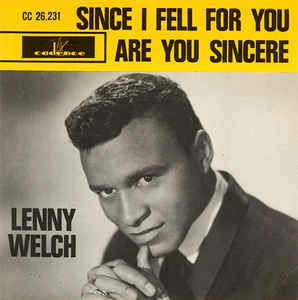
"Since I Fell for You" is a blues ballad composed by Buddy Johnson in 1945 that was first popularized by his sister, Ella Johnson, with Buddy Johnson and His Orchestra.

"Silhouettes" is a song made famous by the doo-wop group the Rays in 1957, peaking at number 3 on the U.S Billboard Hot 100. A competing version by the Diamonds was also successful. In 1965 it was a number 5 hit in the US for Herman's Hermits, and in 1990 it was a number 10 hit in the UK for Cliff Richard.
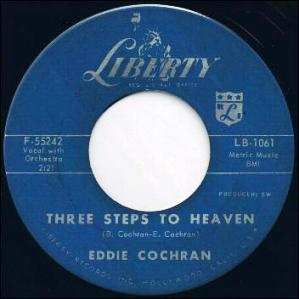
"Three Steps to Heaven" is a song co-written and recorded by Eddie Cochran, released in 1960. The record topped the charts in the Republic of Ireland and the United Kingdom posthumously for Cochran following his death in a car accident in April 1960. In the US it did not reach the Billboard Hot 100.
Beverly Ann Bremers is an American singer and actress. After roles on Broadway, Bremers recorded the 1972 Top 20 hit single, "Don't Say You Don't Remember".
"Pretty Little Angel Eyes" is a 1961 song by American singer Curtis Lee. It was released on Dunes Records, #45-2007. Phil Spector served as producer, and also produced Lee's follow-up hit "Under the Moon of Love".

Shirley M. Gunter was an American singer and songwriter who led one of the earliest female doo-wop groups, Shirley Gunter and the Queens, in the mid-1950s.
















